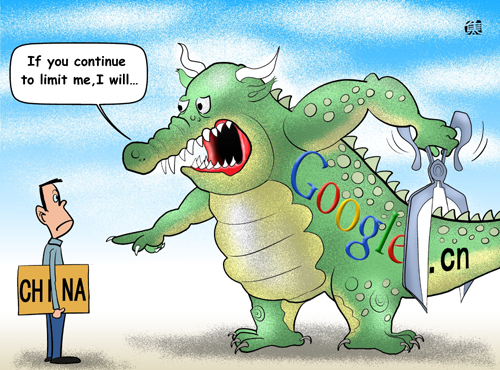An analysis of Google's dilemma
Recently the Google incident has raised heated discussions. It all started with a blog post by Google's Senior Vice President & Chief Legal Consultant David Drummond on January 21, 2010. In the article titled "A new approach to China", Drummond claimed that Google detected "a targeted attack", which resulted in the theft of its intellectual property. He said that Google is "no longer willing to continue censoring the results on Google.cn, and so over the next weeks we (Google) will be discussing with the Chinese government the basis on which we could operate an unfiltered search engine within the law, if at all. We recognize that this may well mean having to shut down Google.cn, and potentially our offices in China."
 |
| Google Gator [By Jiao Haiyang/China.org.cn] |
Soon, people in all walks of life at home and abroad expressed their views on the issue. Some believe that Google's China business is "not at all important" and the search engine's success doesn't rely on the Chinese market. On the other hand, if Google pulls out, China's economic development, particularly its international image will be adversely affected. Foreign companies will question China's investment environment and market profitability, and will eventually drop further investment plans and leave the Chinese market for good. Some people even asserted that China's internet industry will be degraded to the Stone Age and Chinese internet users will be reduced to second-class netizens. Of course there are people who take the opposite sides too. Tang Jun, president & CEO of China's Xinhuadu Industrial Group said "this (Google's pulling out) matters little to Chinese internet users. However it will be the most stupid decision Google has ever made. Pulling out from China equals giving up half of the future world market!"
There are three main views concerning the reasons behind Google's sudden announcement: 1. Google China's business performance has never been satisfying, therefore Google is using the attack as an excuse to quit; 2. China's stringent censorship makes Google unable to maintain normal business operations; 3. Google wanted to quit because its corporate infrastructure suffered attacks which originated from China, causing an infringement of internet security.
In my opinion, the reasons above all seem to have some logic, yet they are not quite convincing. Firstly, Google China isn't doing that badly. It is now the second biggest search engine in China and holds over 30 percent of the total market share. Also, according to latest statistics, Google's market share is increasing gradually.
Secondly, internet supervision is a common international practice. Western countries have established a series of internet regulation measures and laws such as the US Patriot Act and Canada's Personal Information Protection and Electronic Document Act. Similar laws can also be seen in Britain, Australia, New Zealand, Germany and Switzerland. It should be noted that Google has also faced boycotts in Greece, Japan, France, Germany, Saudi Arabia and Turkey, due to reasons including questionable news resources, pornographic pictures, and cultural and ethnic issues. However, Google didn't quit any of those countries.
Thirdly, hacker attacks are a global technical disaster and until now no country has completely managed to avoid cyber attacks from international hackers. If a company chooses to quit the local market whenever it's attacked by local hackers, it's being childish and ridiculous. As Microsoft CEO Steve Ballmer said "There are attacks everyday, I don't think there was anything unusual."
 0
0 






